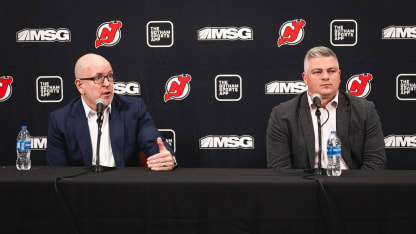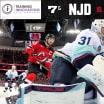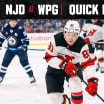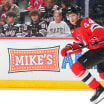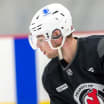Perhaps that identity and system is the biggest takeaway from this past season. The Devils adapted their style from a run-and-gun rush team into a more defensively minded club. A more connected and tight defensive zone posture allowed New Jersey to improve its goals against per game from 3.43 (ranking 26th in the NHL) in 2023-24 to 2.68 (5th) last year.
Implementing that defensive structure is the basis for any future success in the regular season and playoffs.
“If I reflect on where we were a year ago coming in here,” Keefe said, “for me, I really wanted to work to establish a foundation that we could build upon to be a consistent contender in the playoffs, and making the playoffs consistently, and then building out our game from there and giving us every chance to compete for a Stanley Cup.
“When I look back, if I’m looking at the positive part of it, there is a foundation here now. There’s an expectation in terms of what the standard is, not just to make the playoffs, but all the things that go into it to be a team that can compete in the playoffs.”
The change paid immediate dividends as the Devils opened the season with a 24-11-3 record for 51 points (tied for most in the NHL) by Dec. 27. However, the team finished the year with a 18-22-4 mark and lacked consistency in its game during the back half of the season.
“We showed an inability to sustain our game,” Keefe said. “And that's the hardest thing to do in the league, to sustain your game, year over year, throughout a season. Our foundation is in place to continue to build upon. Clearly, we have to continue to get better. We want to sustain our level of play year over year. We were unable to do that throughout our season.
“We've got to continue to raise the standard, continue to push our group to find that level of consistency so that we can sustain play over long periods of time, and overcome adversities.”
The Devils’ play early in the season was a snapshot of the team’s potential. And even in the second half, the Devils raised their game at crucial times to earn a playoff berth by beating Columbus (twice), the NY Rangers and Minnesota (twice) to help solidify their positioning. However, the club never fully found its form from earlier in the season.
“What was the difference from January on? Because we were a really, really good team to start,” Fitzgerald said. “And to me, that’s the standard. We saw the team play at a high level, and that’s where we know we can get to. Again, now it’s the growth of sustaining that. Educating the players and them understanding and being in that experience is only going to get better.”
The new emphasis on defensive play was going to affect the team’s offense. Though the club didn’t expect to drop from 3.22 goals per game (12th) in 2023-24 to 2.93 (20th) last season.
“I think players underachieved, for sure,” Fitzgerald explained. “I think players who have scored enough goals in this league to give assurance that we have depth scoring, didn’t.
“Scoring goals is a hard thing to do in this league. It’s not easy. But we had to figure out different ways to score because of personnel – grinding goals out, getting to the net front, getting to the hard ice, getting in front of the goalie, screens, tips, things like that. And we needed certain guys to pick the pace up a bit as well.”
Improving upon that will be Fitzgerald’s task this summer. He and his hockey operations department set out last summer to improve the goaltending and defense. They accomplished that goal with the acquisitions of goalie Jacob Markstrom and defensemen Dillon, Pesce and Kovacevic. And this summer, they’ll once again look at ways to advance the roster.
“I like our group. My job is to continue to better the group,” Fitzgerald said. “We’ve got a lot of decisions to make on certain players, whether we bring guys back, trade players. We won’t be coming back with the same group, I can tell you that, because it wasn’t good enough.”
On the whole, the Devils took a step forward. They improved their record and earned a berth in the Stanley Cup playoffs for the second time in three years. Many individual players took steps toward growth, whether it was Luke Hughes becoming a legitimate No. 1 defenseman or his brother Jack adding penalty killing to his repertoire or Jesper Bratt setting career highs in assists and points. There was a lot of growth.
And while making the playoffs was one of the many goals, that in itself is not enough. The standard is high in New Jersey.
“When I look at it, we finished 16 out of 32 teams in the regular season (in the standings),” Keefe said. “That's average, and we're not here to be average. We want to be better. We will get better individually, collectively, myself as a coach. Our players individually will have to continue to improve so we can get that level of sustainability that is required to compete in the league.”
The players weren’t the only people growing and learning throughout last season. Keefe now has a full year under his belt. Last season he was coming in new, learning new players, new coaches on his staff, new hockey operations staff. Now, he has a much stronger grasp on his players, what makes them tick, how to motivate and teach them individually and how to maneuver the rigors of the season with his current batch.
And vice versa. The players know what is expected of them from Keefe, what is demanded and what it takes to achieve success. All parties should be much better prepared for next year.
“Coming in for this season, in training camp, it was about setting a foundation, a standard of things that I expect, that are really important to me, that were maybe new, in some cases, to the players,” Keefe said. “Now they know what to expect. Now we can put layers on top of that and take the next step, which obviously is required. That's about continuing to raise the bar. Part of the improving process is me improving as a coach with the information that I now have and the experience with this group and trying to build our team to the next level.”

